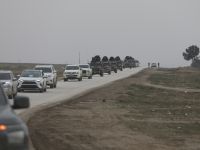Despite attempts by the media and US officials to paint the Taliban milita as financing their defense with drug running, the real players in the heroin trade these days make their home under the wing of the US-allied rebels.
Typical of the Taliban-heroin-scare articles are ones by Italy's Panorama and England's London Times, which have reported that Osama bin Laden’s suspected terrorist group Al Qaeda may have already begun unleashing a dangerous biochemical weapon on the world in the form of heroin.
US lawmakers, meanwhile, have been raising accusations that the Taliban and the heroin trade are entwined.
But according to the Pakistani newspaper Dawn, it was only last year that saw poppy cultivation outlawed in Afghanistan – in areas under Taliban control. The fundamentalist militia made good on promises to wipe out the crop, according to the UN, despite the fact that it was a source of cash for the starving country.
Two years before, Time magazine has reported, Afghanistan provided 75 percent of the world's opium and its derivative, heroin. Then the local mullahs stepped in, and poppies were replaced with food crops, considered more acceptable to both Islamic clerics and the international community.
These days, a lot has changed – and it is now the US-backed rebels who shelter the poppy farmers.
According to Time, “a province held by Washington's unruly ally, the Northern Alliance, accounts for most of Afghanistan's opium production this year.”
The US-based magazine recently noted, deep in an article that highlighted the Taliban’s role in the drug trade, that “a UN drug survey released last month shows farmers in Badakhshan province have carpeted their steep mountain valleys with scarlet-colored opium poppies. Using satellites and investigators on the ground, the UN determined that cultivation this year in Badakhshan has jumped from 2,458 to 6,342 hectares, which accounts for 83 percent of Afghanistan's estimated total production of 185 tons of opium.”
Time said the crop was converted into morphine or low-grade heroin, which was then mostly shipped to Europe and the US across the Iranian desert through Tajikistan or through the Pakistani port of Karachi, with significant amounts seeping into local markets along the way.
The leaky drug trade and the present war in Afghanistan has many of the Central Asian country’s neighbors – especially Pakistan - worried about a smack invasion.
“When the Taliban are at war, they cannot stop poppy cultivation and since the people have to earn something, they do not have any alternative corps to grow,” sources have told the Pakistani newspaper Dawn, which has noted nose-diving street prices.
"[Afghan farmers] are desperate," Mohammad Amirkhizi, a specialist on Afghanistan for the Office for Drug Control and Crime Prevention in Vienna, told Time. "It's the only crop they have to live off."
Another question is whether the Taliban will have any interest in stopping poppy cultivation.
According to Panorama and the London Times, the Taliban order to halt poppy planting seems to have been rescinded when the US first bombed Afghanistan.
This account appears to contradict Time sources, who said Taliban’s top leader Mullah Omar denied last month that he was lifting the ban on poppy growing, and even threatened that the Taliban would kill any farmer disobeying his edict.
The magazine also noted that there was “no evidence that bin Laden's Al Qaeda network ever used Afghan heroin to finance its suspected terrorist activities,” and that most of bin Laden's funds come from rich Islamic sympathizers in the Gulf States and in the Middle East in general.
"Bin Laden has access to plenty of money. He doesn't need to dirty his hands with drugs," one diplomat told the magazine.
But another strategy could be in store. Analysts who believe the Taliban are plotting a drug epidemic note that the Afghans observed the effect of heroin use on the Soviet soldiers, whose morale was reputedly destroyed more by smack than by the resistance fighters.
But even given the will to deal drugs, the fact remains that whatever opium is left over after the Taliban’s “no-poppies” edict has a very short shelf life, according to Dawn.
So if the Taliban get serious about their alleged plan to drop the “heroin bomb” on American special forces, they may have to buy some from the US-backed Northern Alliance -- Albawaba.com
© 2001 Al Bawaba (www.albawaba.com)







